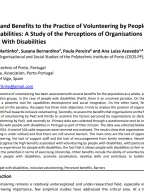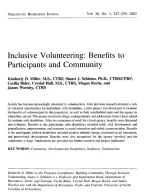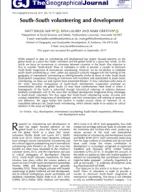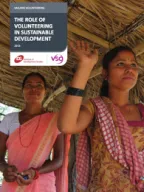Volunteering and South-South cooperation (SSC) share the “common principles of ‘mutuality, reciprocity, respect and equality’ and […] have the potential to promote participatory and needs-based approaches to development, while cultivating global citizens and strengthening people to people ties.” (UNV, 2020)
Based on the 2016 ‘Framework of Operational Guidelines on United Nations Support to South-South and Triangular Cooperation’ (SSC/19/3), SSC refers to the technical cooperation among two or more developing countries through exchanging knowledge, skills, resources and technical know-how and through regional and interregional collective actions, including partnerships involving governments, regional organizations, civil society, academia, the private sector and other relevant actors.
As an international cooperation modality that strengthens SSC, triangular cooperation (TrC) is “collaboration in which traditional donor countries and multilateral organizations facilitate South-South initiatives through the provision of funding, training, management and technological systems as well as other forms of support” (United Nations Office for South-South Cooperation – UNOSSC).
South-South and triangular cooperation (SSTC) and volunteerism are mutually reinforcing concepts. Experienced volunteers with transferable skills enable people-oriented knowledge exchange among countries of the Global South. Close interaction between international volunteers from the Global South and local communities also helps localize the Sustainable Development Goals (SDGs).
For more information on SSC, please visit South-South Galaxy (UNOSSC): https://www.southsouth-galaxy.org/. South-South Galaxy is a global knowledge-sharing and partnership-brokering platform, supported by UNOSSC, United Nations organizations and development partners. It serves as a consolidated South-South solutions platform for Southern partners and the United Nations system, and acts as a one-stop-shop for all partners to utilize.

















